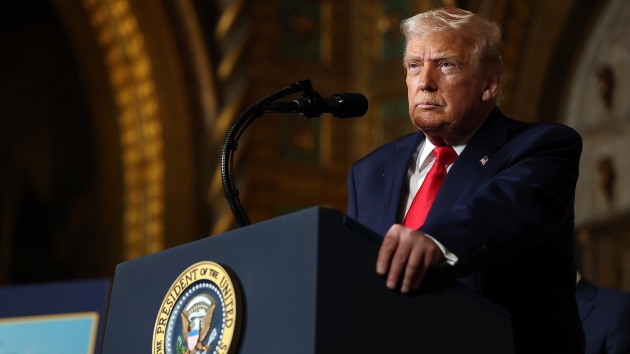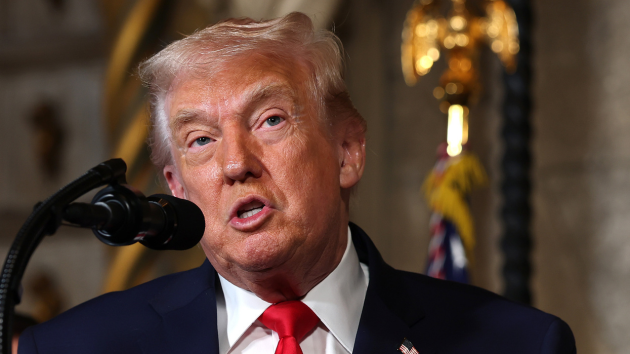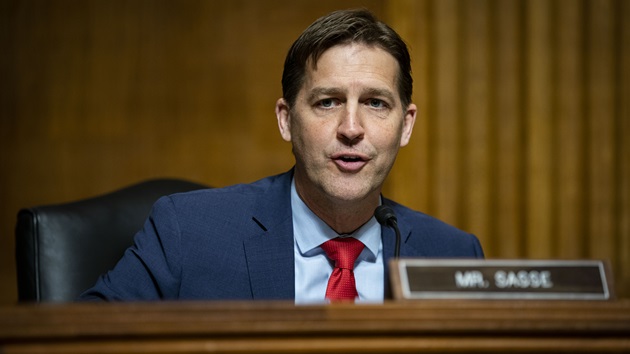Supreme Court hears historic Trump 14th Amendment case: Key moments
Written by ABC AUDIO ALL RIGHTS RESERVED on February 9, 2024

(WASHINGTON) — The U.S. Supreme Court is taking up a historic case challenging Donald Trump’s ability to hold office again over his role in the Capitol attack on Jan. 6, 2021.
Trump is asking the justices to overturn an unprecedented Colorado Supreme Court decision deeming him ineligible to appear on the state’s GOP primary ballot because, it said, he “engaged in insurrection.” Trump has long denied any wrongdoing.
The legal battle centers on a previously obscure provision of the Constitution’s 14th Amendment — Section 3 — ratified shortly after the Civil War.
The case is casting a political shadow over the nation’s highest court not has not been seen since the 2000 election with Bush v. Gore.
Here’s how the news is developing. All times Eastern:
Feb 08, 12:37 PM
Trump speaks after arguments conclude
Donald Trump spoke from Mar-a-Lago in Florida moments after the arguments concluded at the U.S. Supreme Court in Washington.
The former president largely focused his criticism on President Joe Biden, but briefly addressed what transpired at the nation’s high court.
“In watching the Supreme Court today, I thought it was a very beautiful process,” he said. “I hope that democracy in this country will continue because right now we have a very, very tough situation with all of these radical left ideas.”
Feb 08, 12:29 PM
Justice Alito expresses concern about states retaliating
Justice Samuel Alito, questioning the Colorado solicitor general, brought up the possibility of other states retaliating and excluding another candidate from their ballot.
Shannon Stevenson sought to downplay those concerns.
“I think we have to have faith in our system that people will follow their election processes appropriately,” she said. “That they will take realistic views of what insurrection is under the 14th Amendment. Courts will review those decisions. This court may review some of them. But I don’t think that this court should take those threats too seriously in its resolution of this case.”
Feb 08, 12:12 PM
Attorney for Colorado secretary of state begins argument
Shannon Stevenson, the Colorado solicitor general, is now representing Secretary of State Jena Griswold. She is making the case that Colorado has the power, under state election code, to disqualify candidates who are ineligible to assume the office they’re seeking.
“Nothing in the Constitution strips the states of their power to direct presidential elections in this way,” she said in her opening. “This case was handled capably and efficiently by the Colorado courts under a process that we’ve used to decide ballot changes for more than century. And as everyone agrees, the court now has the record that needs to to resolve these important issues.”
Feb 08, 12:07 PM
Challengers’ counsel argues this case is about ‘protecting democracy’
Justice Brett Kavanaugh asked whether the high court should think about democracy when interpreting Section 3, specifically the right of the people to elect candidates of their choice.
Murray, in a lengthy answer, gave an impassioned argument that this case is at the heart of protecting democracy.
“Constitutional safeguards are for the purpose of safeguarding our democracy, not just for the next election cycle but for generations to come,” he said. “And second, Section 3 is designed to protect our democracy in that very way. The framers of Section 3 knew from painful experience that those who had violently broken their oaths to the Constitution couldn’t be trusted to hold power again again because they could dismantle our Constitution democracy from within.”
“President Trump can go ask Congress to give him amnesty by a two-thirds vote but, unless he does that, our Constitution protects us from insurrectionists,” he continued. “This case illustrates the danger of refusing to apply section as written because the reason we’re here is that President Trump tried to disenfranchise 80 million Americans who voted against him and the constitution doesn’t require that he be given another chance.”
Feb 08, 11:49 AM
Justice Alito: ‘Would we have to have our own trial?’
Justice Samuel Alito pressed Murray on what the U.S. Supreme Court should do if different states adjudicate Trump’s conduct differently based on different sets of evidence or standards of proof.
“Would we have to decide what is appropriate standard of proof?” Alito asked. “Would we give any deference to these findings by state court judges, some of whom may be elected? Would we have to have our own trial?”
“No, your honor, this court takes the evidentiary record as it’s given,” Murray said. “And here we have an evidentiary record that all the parties agree is sufficient for a decision in this case.”
Feb 08, 11:37 AM
Chief Justice Roberts says Colorado case could mean disqualification efforts against Dems
“It would seem to me to be plain if Colorado position is upheld, surely there will be disqualification proceedings on the other side and some of those succeed,” Chief Justice John Roberts said.
“The fact that there are potential frivolous applications of a constitutional provision isn’t a reason to …,” Murray began to respond before Roberts cut him off.
“You might think they’re frivolous, I think people who are bringing them may not think they’re frivolous,” Roberts said. “Insurrection is a broad, broad term and there’s some debate about it.”
“There’s a reason Section 3 has been dormant for 150 and it’s because we haven’t seen anything like Jan. 6 since Reconstruction,” Murray countered.
Feb 08, 11:27 AM
Attorney for Trump challengers says US Supreme Court must ‘settle this issue for the nation’
Justice Elena Kagan asked Murray, the attorney for the Colorado voters, why a single state should be able to decide who gets to be president of the United States.
“That seems quite extraordinary doesn’t it?” she asked.
“No, because ultimately it’s this court that’s going to decide that question of federal constitutional eligibility and settle issue for the nation,” Murray replied.
Feb 08, 11:14 AM
Attorney for Colorado voters begins argument: ‘Trump disqualified himself’
Jason Murray, arguing the case for the Colorado voters seeking to bar Trump from the state’s GOP primary ballot, opened by noting the unprecedented nature of the case.
“We are here because for the first time since the War of 1812 our nation came under violent assault,” he said. “For the first time in history, a sitting president of the United States tried to disrupt the peaceful transfer of presidential power by engaging in insurrection against the Constitution.”
“President Trump disqualified himself,” Murray said.
Feb 08, 11:11 AM
Justice Jackson asks Trump lawyer what constitutes an insurrection
Justice Ketanji Brown Jackson pressed Mitchell on the Colorado Supreme Court’s finding that the violent attempts by Trump supporters to halt the electoral count on Jan. 6 qualified as an “insurrection” under Section 3.
“Why would this not be an insurrection?” Jackson asked. “What’s your argument that it’s not?”
“For an insurrection there needs to an organized, concerted effort to overthrow the government of the United States through violence. And this riot that occurred …” Mitchell began.
Jackson interrupted, “So, the point that a chaotic effort to overthrow the government is not an insurrection?”
“We didn’t concede that it’s an effort to overthrow the government either Justice Jackson, right?” Mitchell continued. “None of these criteria were met. This was a riot. It was not an insurrection. The events were shameful, violent, all those things. It was not an insurrection as that term is used in Section 3.”
Feb 08, 11:01 AM
Arguments largely centered on text of Section 3: Here’s what it says
The justices, so far, are avoiding thornier questions around Trump’s conduct on Jan. 6 and instead focusing on Section 3 of the 14th Amendment.
The provision reads: “No person shall be a Senator or Representative in Congress, or elector of President and Vice-President, or hold any office, civil or military, under the United States, or under any State, who, having previously taken an oath, as a member of Congress, or as an officer of the United States, or as a member of any State …”
Key in the debate is whether Trump is an “officer of the United States” as described by Section 3 and whether or not it is self-executing.
Feb 08, 10:56 AM
Trump attorney: State officials can’t disqualify even if candidate is ‘admitted insurrectionist’
Mitchell, continuing to argue Congress must enforce Section 3, argued state officials can’t take action even if a candidate were to openly acknowledge they participated in an insurrection against the United States.
“Because even if candidate is an admitted insurrectionist, Section 3 still allows the candidate to run for office and even win election to office and then see whether Congress lifts that disability after the election,” Mitchell said.
“This happened frequently in the wake of the 14th Amendment, where confederate insurrectionists were elected to Congress, and sometimes they obtained a waiver, sometimes they did not,” he continued.
Feb 08, 10:36 AM
Justice Alito questions impact of Colorado decision on other states
Justice Samuel Alito pressed Mitchell on the impact the Colorado decision may have on other states.
Mitchell warned about the possibility of national disuniformity.
“Your question gives rise to an even greater concern because if the decision does not have conclusive effect on other lawsuits, it opens the possibility that a different factual record could be developed in some of the litigation that occurs in different states and different factual findings could be entered by state trial judges,” he said. “They might conclude, in fact, that President Trump did not have any intent to engage in incitement or make a finding that differs from what this trial court found.”
Feb 08, 10:20 AM
First question comes from Justice Thomas, who faced calls for recusal
The first question to Mitchell came from Justice Clarence Thomas, who has been in the spotlight due to his wife Ginni’s role in Jan. 6.
Some called on Thomas to recuse himself from this case.
Thomas asked Mitchell if Section 3 is self-executing — a key issue in this case. Mitchell said the provision needs congressional enforcement.
Feb 08, 10:18 AM
Trump attorney kicks off oral arguments
Jonathan Mitchell, Trump’s attorney, in his opening statement, asserted that the Colorado Supreme Court decision is “wrong and should be reversed for numerous independent reasons.”
Mitchell argued that Trump is not covered under Section 3 as an elected official and claiming he is not an “officer” of the United States. He also said that Section 3 cannot apply to a candidate, only those who hold office.
He said that if the U.S. Supreme Court affirms the Colorado Supreme Court’s decision, it would “take away votes of potentially tens of millions of Americans.”
Feb 08, 10:02 AM
Scenes from outside the U.S. Supreme Court
Ahead of the historic arguments, some anti-Trump demonstrators gathered outside the front of the building with banners and signs disparaging the former president.
Police also took steps to ramp up security by placing fencing around the court.
Feb 08, 9:38 AM
What Americans think SCOTUS should do with Trump ballot challenges
An ABC News/Ipsos poll found a majority of Americans (56%) were willing to see Trump disqualified in all or some states: 30% said the U.S. Supreme Court should bar him completely and 26% said it should let each state decide.
Thirty-nine percent said the U.S. Supreme Court should keep Trump on the ballot in all states.
Americans were split on the decisions out of Maine and Colorado to bar Trump from the ballot: 49% supported them while 46% were opposed.
Feb 08, 9:52 AM
What to know about the arguments
There are 80 minutes total allotted for arguments but the court is expected to go over that timeframe.
A number of questions are likely to be debated: Is Trump an “officer” of the United States to whom Section 3 applies; who can enforce Section 3; and did Trump engage in an insurrection?
Trump is being represented by Jonathan Mitchell, a former clerk to Justice Antonin Scalia. The Colorado voters are being represented by Jason Murray, a former clerk to Justice Elena Kagan and Justice Neil Gorsuch.
Copyright © 2024, ABC Audio. All rights reserved.





